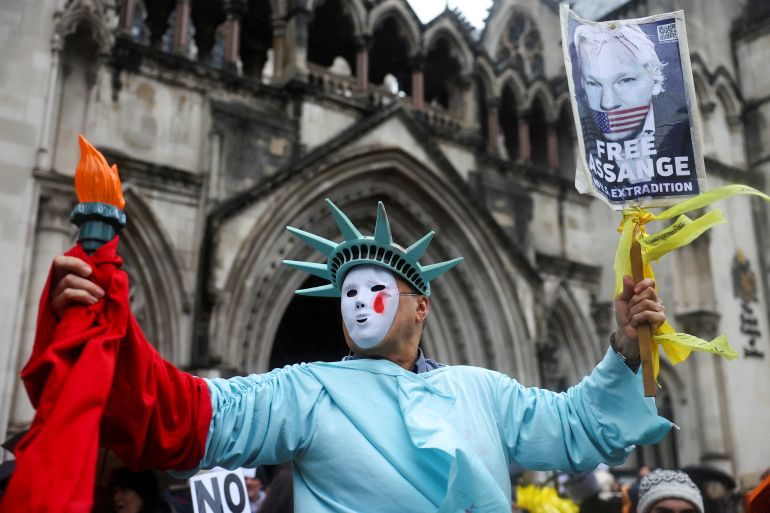US lawyers urge UK court to block Julian Assange extradition appeal bid
London court deciding if WikiLeaks founder should have further opportunities to argue his case before a UK court.

Lawyers for the United States have urged a London court to block a last-ditch bid by WikiLeaks founder Julian Assange to appeal his extradition from the United Kingdom to face espionage charges.
On the second and final day of a hearing at London’s High Court on Wednesday, lawyers representing the US said Assange is being prosecuted for publishing sources’ names and not for his political opinions.
Keep reading
list of 4 itemsHistory Illustrated: Julian Assange’s last stand?
Julian Assange appeals in ‘most important press freedom case in the world’
Who is Julian Assange? Will he be extradited to the US?
The US is seeking to put Assange on trial for WikiLeaks’ release of vast troves of confidential US military records and diplomatic cables. They argue the leaks imperilled the lives of their agents.
Assange’s supporters, however, hail him as a hero who is being persecuted for exposing US wrongdoing, while rights groups are concerned that his prosecution could curb press freedom more broadly.
The two senior judges hearing the case, Victoria Sharp and Jeremy Johnson, opted against issuing an immediate ruling. “We will reserve our decision,” Sharp said as the case concluded.
On Tuesday, Assange’s lawyers had told the court that the case was politically motivated, arguing their client was targeted for his exposure of “state-level crimes” and that Donald Trump had requested “detailed options” on how to kill him.
But, on Wednesday, lawyers for the US said Assange’s prosecution was “based on the rule of law and evidence”.
Assange “indiscriminately and knowingly published to the world the names of individuals who acted as sources of information to the US”, lawyer Clair Dobbin said.
“It is these core facts which distinguish the position of the appellant from the New York Times and other media outlets,” she added. “It is this which forms the objective basis for his prosecution. It is these facts which distinguish him, not his political opinions.”
Assange himself was again not in court on Wednesday nor watching remotely because he was unwell.
‘Protect press freedom’
Assange, 52, has been indicted in the US on 17 charges of espionage and one charge of computer misuse over WikiLeaks’ publication of classified US documents some 15 years ago.
The UK government approved Assange’s extradition to the US in June 2022, after a judge initially blocked it.
The High Court in London is now determining whether Assange will have further opportunities to argue his case before a UK court, or whether he has exhausted all appeals in the country and must therefore enter the process of extradition.
If Assange loses permission to appeal, he will be at risk of prosecution in the US under the Espionage Act of 1917 and could face a sentence of up to 175 years.
But his supporters say an extradition would be an inadvertent death sentence. “His life is at risk every single day he stays in prison, and if he’s extradited, he will die,” his wife Stella Assange recently told reporters.
Jameel Jaffer, a professor of law and journalism at Columbia University, said the case is the first in which the US government has relied on the 1917 Espionage Act as the basis for the prosecution of a publisher.
“A successful prosecution of Assange on the basis of this indictment would criminalise a great deal of the investigative journalism that is absolutely crucial to democracy,” he told Al Jazeera.
Rights groups have expressed similar concerns. “If Julian Assange is extradited, it will establish a dangerous precedent wherein the US government could target publishers and journalists around the world for extradition and prosecution,” Rose Kulak, Amnesty International’s Australia campaigner, said in a statement this week.
Reporters Without Borders called on the US government to cease Assange’s “endless persecution” and drop the case.
“No one should face such treatment for publishing information in the public interest,” said Rebecca Vincent, the media watchdog’s director of campaigns. “It’s time to protect journalism, press freedom, and all of our right to know. It’s time to free Assange now.”
The two justices in London will deliver their verdict at a later, though as yet unspecified, date. If the ruling is in Assange’s favour, a full appeal hearing will be held to again consider his challenge. But if the WikiLeaks founder loses, his only remaining option would be at the European Court of Human Rights.